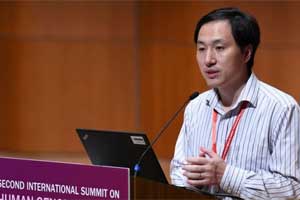- Home
- Editorial
- News
- Practice Guidelines
- Anesthesiology Guidelines
- Cancer Guidelines
- Cardiac Sciences Guidelines
- Critical Care Guidelines
- Dentistry Guidelines
- Dermatology Guidelines
- Diabetes and Endo Guidelines
- Diagnostics Guidelines
- ENT Guidelines
- Featured Practice Guidelines
- Gastroenterology Guidelines
- Geriatrics Guidelines
- Medicine Guidelines
- Nephrology Guidelines
- Neurosciences Guidelines
- Obs and Gynae Guidelines
- Ophthalmology Guidelines
- Orthopaedics Guidelines
- Paediatrics Guidelines
- Psychiatry Guidelines
- Pulmonology Guidelines
- Radiology Guidelines
- Surgery Guidelines
- Urology Guidelines
First genetically modified babies: Breakthrough or Violation?

China: A Chinese researcher, who has been in the eye of the storm recently, following claims of his developing the world's first genetically edited twin babies, recently announced a halt to the trial of gene editing after facing an international outcry. The researcher who had earlier excitedly shared his results is now under the scrutiny of the government
He Jiankui had told a packed Hong Kong biomedical conference he was "proud" to have successfully altered the DNA of twin girls born to an HIV-positive father, an apparent medical breakthrough. "The clinical trial was paused due to the current situation," said He. "For this specific case, I feel proud, actually, I feel proudest," AFP quotes him.
Medical Dialogues had earlier reported the scientist, He Jiankui, an associate professor in the Department of Biology of the Southern University of Science and Technology in Shenzhen, China, claims of developing the world’s first genetically modified human — twin girls whose DNA has been altered with a powerful new tool capable of rewriting the very blueprint of life.
The researhcer clarified that the goal of the experiment was not to prevent or cure any inherited disease but to bestow a trait that is present in few people naturally — an ability to resist possible future infection with HIV, the AIDS virus.
The gene editing was done through the tool, called CRISPR-cas9, makes it possible to operate on DNA to supply a needed gene or disable one that’s causing problems.
Also Read: Chinese researcher develops world’s first genetically modified babies
Since the research came to light, it triggered many controversies revolving around the subject. An immediate backlash was triggered as details of the experiment has not been independently verified and experts have denounced his work as an ethical "mess".
The university professor said the twin girls, born a few weeks ago, had their DNA altered to prevent them from contracting HIV. Eight volunteer couples -- HIV-positive fathers and HIV-negative mothers -- signed up to the trial, with one dropping out before it was paused.
He said there had been "another potential pregnancy" involving a second couple, but when questioned further agreed it had been a chemical pregnancy -- a term referring to a very early miscarriage.
The experiment has prompted heated debate among the scientist over the risks involved. The experts have warned that -- Editing human embryos can create unintended mutations in other areas -- so-called "off-target effects" which can have an impact through the lifetime. Gene editing practice is illegal in the United States.
"The volunteers were informed of the risk posed by the existence of one potential off-target and they decided to implant," He clarified, as he was bombarded with questions about the trial.
He also said he had personally paid for most of the patients' medical expenses, and that his university in the southern Chinese city of Shenzhen had been "unaware of the study's conduct."
Southern University of Science and Technology distanced itself from He, saying he had been on unpaid leave since February and had "seriously violated academic ethics".
Summit chair David Baltimore, a Nobel laureate, said there had been "a failure of self-regulation by the scientific community".
Antonio Regalado, senior editor for biomedicine for MIT Technology Review -- the publication which first highlighted the trial on Sunday -- said He's talk was "ethically a half-baked mess".
He, said the twins' DNA was modified using CRISPR, a technique which allows scientists to remove and replace a strand with pinpoint precision.
But the co-inventor of CRISPR condemned He's trial as dangerous and unnecessary.
"My concern is that this experiment really shouldn't have happened," said Feng Zhang told reporters at the conference. "What he has done was not science."
A union of Chinese scientists issued a statement saying it "resolutely opposes so-called scientific researches and biotech applications that violate the spirit of science and ethics," reported AFP.
There is a history of fraud within China's academic community -- including a scandal last year that led to the withdrawal of 100 "compromised" papers.
[poll id=112447]

Disclaimer: This site is primarily intended for healthcare professionals. Any content/information on this website does not replace the advice of medical and/or health professionals and should not be construed as medical/diagnostic advice/endorsement or prescription. Use of this site is subject to our terms of use, privacy policy, advertisement policy. © 2020 Minerva Medical Treatment Pvt Ltd